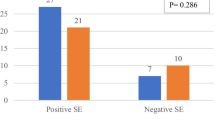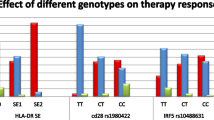Abstract
The aim of this study was to determine the influence of HLA-DRB1 and HLA-DQB1 genes on the disease susceptibility and the disease severity in elderly onset rheumatoid arthritis (EORA) compared with young onset rheumatoid arthritis (YORA) in Korean patients. Genetic analysis of HLA-DRB1 and HLA-DQB1 alleles was performed in three groups. Group 1 included 63 patients who were diagnosed with (rheumatoid arthritis) RA after the age of 60 (EORA). Group 2 consisted of 109 patients who were diagnosed with RA before the age of 60 (YORA). Group 3 involved 133 normal controls. The shared-epitope-coding alleles included the members of the HLA-DRB1*04 allele group (*0401, *0404, *0405, *0408, *0410), HLA-DRB1*01 allele group (*0101,*0102), HLA-DRB1*1001, and HLA-DRB1*1402. The disease severity was assessed by the modified total sharp score (mTSS). The shared-epitope-coding alleles were more frequently observed in the RA patients than in the normal controls. The shared-epitope-coding alleles were less frequently found in EORA group than YORA group (31/63 (49.2 %) in group 1, 72/109 (66.1 %) in group 2, 45/133 (33.8 %) group 3, p = 0.02). Although the mTSS of the group 1 was higher than group 2 at symptom onset, the overall mean mTSS of the group 1 was lower than that of group 2 (26.8 vs. 57.5, p < 0.05). HLA-DQ*04 showed the higher frequency in the patients group than in normal controls (p < 0.001). And HLA-DQ*04 was less commonly found in the patients with EORA than YORA (p < 0.05). The influence of shared epitope and HLA-DQ*04 alleles may be less significant on disease susceptibility in EORA. The presence of shared-epitope-coding alleles did not appear to influence on disease severity in EORA patients as well as in YORA patients. Radiologic deterioration in EORA group was less severe than in YORA group. The presence of shared epitope and radiologic progression are less prominent in EORA patients than YORA patients.

Similar content being viewed by others
References
Hellier JP, Eliaou JF, Daurès JP, Sany J, Combe B (2001) HLA-DRB1 genes and patients with late onset rheumatoid arthritis. Ann Rheum Dis 60:531–533
Jung SJ, Ghil J, Choi ST, Kang EJ, Lee SW, Park MC et al (2006) Clinical characteristics of late-onset rheumatoid arthritis. J Korean Rheum Assoc 13:291–298
Yoo TS, Kim TH, Jun JB, Chang DK, Jung SS, Lee IH et al (1999) The characteristics of elderly onset rheumatoid arthritis. J Korean Rheum Assoc 6:103–109
Kim HO, Yoon HS, Kwok SK, Ju JH, Park KS, Park SH, Kim HY (2010) Clinical characteristics of elderly onset rheumatoid arthritis. J Korean Geriatr 14:227–233
Yukioka M, Wakitani S, Murata N, Toda Y, Ogawa R, Kaneshige T, Ochi T (1998) Elderly-onset rheumatoid arthritis and its association with HLA-DRB1 alleles in Japanese. Br J Rheumatol 37:98–101
Liu SC, Chang TY, Lee YJ, Chu CC, Lin M, Chen ZX, Liu HF, Dang CW, Chang SC, Lee CS, Chen TL, Huang CH (2007) Influence of HLA-DRB1 genes and the shared epitope on genetic susceptibility to rheumatoid arthritis in Taiwanese. J Rheumatol 34:674–680
Minn DS, Kim TY (2001) The clinical significance of shared epitope in rheumatoid arthritis. J Korean Rheum Assoc 8:34–40
Massardo L, Gareca N, Cartes MA, Cervilla V, González A, Jacobelli S (2001) The presence of the HLA-DRB1 shared epitope correlates with erosive disease in Chilean patients with rheumatoid arthritis. Rheumatology 41:153–156
Kim HY, Kim JK, Yang HI, Park SH, Hong YS, Jee WH, Lee SH, Cho CS, Kim TG, Han H (1997) The impact of HLA-DRB1*0405 on disease severity in Korean patients with seropositive rheumatoid arthritis. Br J Rheumatol 36:440–443
Kınıklı G, Ates A, Turgay M, Akay G, Kınıkl S, Tokgöz G (2003) HLA-DRB1 genes and disease severity in rheumatoid arthritis in Turkey. Scand J Rheumatol 32:277–280
Bukhari M, Lunt M, Barton A, Bunn D, Silman A, Symmons D (2007) Increasing age at symptom onset is associated with worse radiological damage at presentation in patients with early inflammatory polyarthritis. Ann Rheum Dis 66:389–393
Laivoranta-Nyman S, Möttönen T, Hermann R, Tuokko J, Luukkainen R, Hakala M, Hannonen P, Korpela M, Yli-Kerttula U, Toivanen A, Ilonen J, the FIN-RACo Trial Group (2004) HLA-DR-DQ haplotypes and genotypes in Finnish patients with rheumatoid arthritis. Ann Rheum Dis 63:1406–1412
Milicic A, Lee D, Brown MA, Darke C, Wordsworth BP (2002) HLA-DR/DQ haplotype in rheumatoid arthritis: novel allelic association in UK Caucasians. J Rheumatol 29:1821–1826
Rasch EK, Hirsch R, Paulose-Ram R, Hochberg MC (2003) Prevalence of rheumatoid arthritis in persons 60 years of age and older in the United States: effect of different methods of case classification. Arthritis Rheum 48:917–926
Gregersen PK, Silver J, Winchester RJ (1987) The shared epitope hypothesis. An approach to understanding the molecular genetics of susceptibility to rheumatoid arthritis. Arthritis Rheum 30:1205–1213
Winchester R, Dwyer E, Rose S (1992) The genetic basis of rheumatoid arthritis. The shared epitope hypothesis. Rheum Dis Clin North Am 18:761–783
Hong GH, Park MH, Takeuchi F, Oh MD, Song YW, Nabeta H et al (1996) Association of specific amino acid sequence of HLA-DR with rheumatoid arthritis in Korean and its diagnostic value. J Rheumatol 23:1699–1703
Peltomaa R, Leirisalo-Repo M, Helve T, Paimela L (2000) Effect of age on 3 year outcome in early rheumatoid arthritis. J Rheumatol 27:638–643
De Vries N, Van Elderen C, Tussen H, Van Riel PL, Van de Putte LB (1999) No support for HLA–DQ encoded susceptibility in rheumatoid arthritis. Arthritis Rheum 42:1621–1627
Fugger L, Svejgaard A (1997) The HLA-DQ7 and –DQ8 associations in DR4-positive rheumatoid arthritis patients. Tissue Antigens 50:494–50021
Ali AA, Moatter T, Baig JA, Iqbal A, Hussain A, Iqbal MP (2006) Polymorphism of HLA-DR and HLA-DQ in rheumatoid arthritis patients and clinical response to methotrexate–a hospital-based study. J Pak Med Assoc 56:452–456
Yuan G, Shi G, Li Z (1997) DNA typing for HLA-DR and HLA-DQ alleles in Chinese patients with rheumatoid arthritis. Zhonghua Nei Ke Za Zhi 36:234–237
Acknowledgments
This research was supported by Public welfare & Safety Research Program through the National Research Foundation of Korea (NRF) funded by the Ministry of Education, Science and Technology (2010-0020767); the National Project for Personalized Genomic Medicine, Ministry for Health & Welfare, Republic of Korea (A111218-PG01); the Korea Healthcare Technology R&D Project, Ministry of Health, Welfare & Family Affairs, Republic of Korea (A092258).
Conflict of interest
The authors have no conflict of interest to declare.
Author information
Authors and Affiliations
Corresponding authors
Additional information
Eun-Ji Kim/Jennifer Lee and Tai-Gyu Kim/Ho-Youn Kim have contributed equally to this work.
Rights and permissions
About this article
Cite this article
Kim, EJ., Lee, J., Ryu, YS. et al. Shared epitope and radiologic progression are less prominent in elderly onset RA than young onset RA. Rheumatol Int 33, 2135–2140 (2013). https://doi.org/10.1007/s00296-013-2670-y
Received:
Accepted:
Published:
Issue Date:
DOI: https://doi.org/10.1007/s00296-013-2670-y




